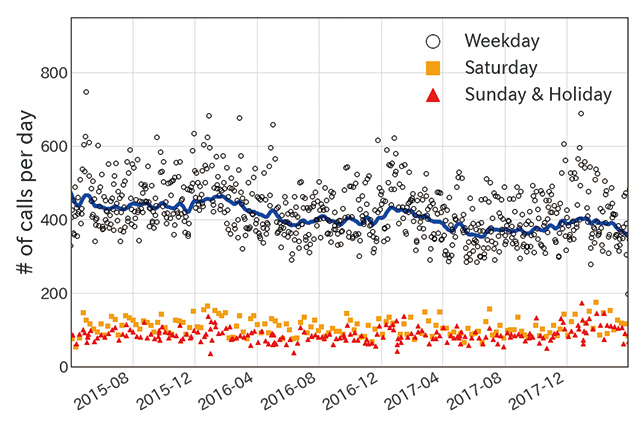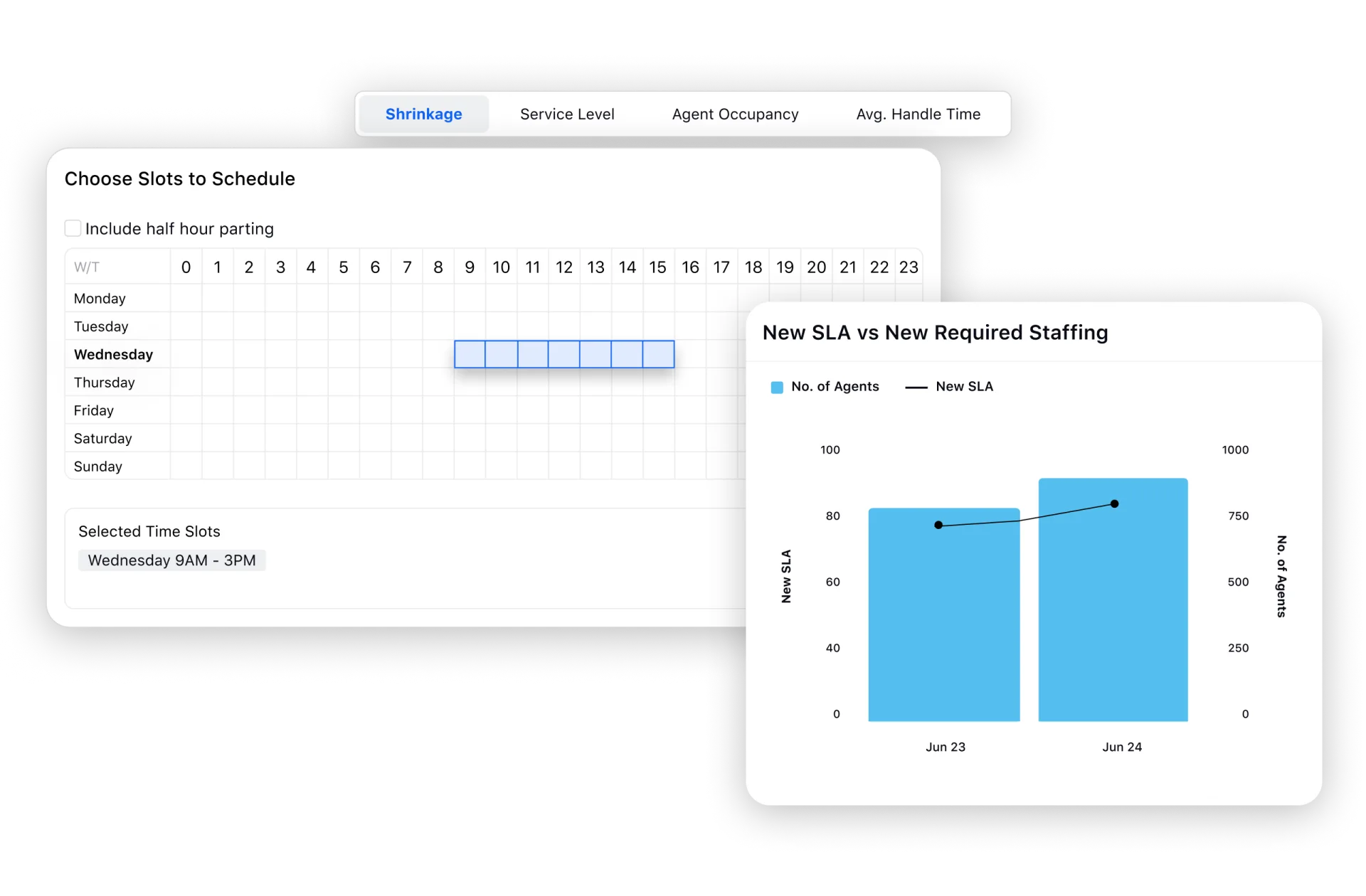In today's fast-paced business landscape, staying ahead of the competition hinges on delivering top-notch customer service. Call centers are the bulwark of customer service. They are the unsung heroes connecting businesses and their customers through seamless communication and fast issue resolutions.
But here's the secret that keeps them running like well-oiled machines: call center scheduling. For many, it's the art of strategically using resources, assigning the right agents to suitable shifts and keeping those service-level agreements in check.
But there's a lot more to it.
In this article, we'll dive deep into the world of call center scheduling, exploring its immense significance and uncovering the best practices to supercharge your operational efficiency. Get ready to master the scheduling game and take your call center to the next level.
What is call center scheduling?
Call center scheduling is a workforce management activity that entails assigning agents to work shifts based on factors such as anticipated call volumes, agent availability and required skill sets.
Effective scheduling ensures that sufficient agents are always available to promptly and efficiently handle customer inquiries, regardless of time and seasonal shifts in case/call volumes. It typically involves:
forecasting call volumes
determining staffing requirements
creating schedules that maximize agent productivity while meeting service-level objectives.
Additionally, it unlocks your team's potential by routing cases intelligently to the right agent so the available staff is able to close all queries in their queue, without getting overwhelmed.
That said, call center scheduling is not failproof. There can be unforeseen dips and surges in call volumes, agents may call in sick or infrastructural outages that upset all the planning. But modern, AI-powered customer support solutions make allowances for instant intraday changes, taking into account dynamic factors like agent preferences, flex schedules and unplanned contingencies - so you and your customers are never left in the lurch.
Recommended reading: Automated routing - Predictive & intelligent routing
How does call center scheduling work?

The process of call center scheduling involves carefully managing and organizing the workforce to ensure optimal staffing levels and efficient operations. It typically comprises the following key steps:
Forecasting: Call centers analyze historical data, seasonal patterns and other factors to forecast call volumes.
Staffing requirements: According to the forecasted call volumes, staffing requirements are calculated.
Shift creation: Shift schedules are created to cover the forecasted call volume, considering factors like peak hours, employee preferences and regulatory compliance.
Agent assignments: Agents are assigned to specific shifts or schedules, considering their skills, availability and performance.
Real-time monitoring: Supervisors and workforce management tools monitor call volumes and agent performance in real-time to identify any deviations from the forecast or staffing plan.
Schedule adherence: Agents are expected to adhere to their assigned schedules and be present and available for their designated shifts.
Performance management: Call center scheduling work includes analyzing key performance metrics such as average handle time, call abandonment rate and service level attainment.
Also read: Top Call Center Metrics to Track in 2023
Importance of call center scheduling
Efficient call center scheduling offers several benefits that eventually improve your customer experience and increase operational efficiency. Let's discuss them in detail
Meeting customer demand
Call volumes in a call center vary significantly throughout the day, week and season. By analyzing historical data and forecasting future call volumes, call center managers can schedule adequate agents during peak hours to prevent long wait times.
As an example, imagine the chaos and excitement of Black Friday, the ultimate shopping frenzy. In this whirlwind, Amazon stands strong, prepared for anything. As the clock strikes midnight, their call centers burst to life, flooded with customer inquiries.
Amazon's secret weapon? A well-staffed army of support agents, working tirelessly to ensure no question goes unanswered.
High agent productivity
Accurate schedules take into account agent skills, experience and preferences. As a result, call center scheduling maximizes productivity by assigning suitable agents to specific tasks.
Renowned for its unparalleled commitment to customer service, Zappos strategically optimizes call center scheduling to enhance agent productivity. They've mastered the art of orchestrating their workforce, ensuring each customer interaction receives personalized and attentive service. Zappos assures an elevated customer experience that demonstrates their unwavering dedication to delivering top-notch service.
Learn more: How your contact center can leverage AI to improve agent productivity and boost morale
Cost optimization
Inefficient scheduling can result in overstaffing, leading to unnecessary labor costs. Conversely, understaffing can result in excessive overtime payments or subpar service quality. With call center scheduling, you can balance your staffing levels and operational costs, ultimately improving the cost efficiency of your call center.
Agent satisfaction
Scheduling systems incorporating agent preferences and considering work-life balance lead to increased agent satisfaction and reduced turnover rates. In addition, agents are more likely to perform better when content with their schedules. This results in improved service quality and reduced training costs.
Interested to learn more? Read The call center guide to agent retention
Best practices to optimize call center scheduling
Call center scheduling is a complex activity, which needs to be dealt with with precision, empathy and foresight. As your channels, customer base and business scale increase, you will invariably expand your workforce and call schedules. That's where you need certain industry best practices to help simplify and optimize call center scheduling for you.
Ensure accurate forecasting
The foundation of effective call center scheduling lies in accurate forecasting. By analyzing historical call data, seasonal patterns, marketing initiatives and other relevant factors, call center managers can predict future call volumes and plan staffing accordingly.
Utilizing advanced analytics and forecasting tools can aid in generating more precise predictions.
Leverage skill-based scheduling
Assigning agents with specific skills to appropriate shifts ensures customers are routed to the most qualified agents.

Need a real-life example?
A Middle Eastern telecommunications company was struggling to keep up with their competitors in terms of response time on social channels. They wanted to respond quickly, but without adding headcount to their contact center.
To that end, they implemented skill-based routing in their call center scheduling to carefully match agents' specific skills and expertise with the nature of customer inquiries - technical, load management or other.
For instance, technical issues were routed to agents with specialized technical knowledge, while load management inquiries were directed to agents well-versed in the product.
The result?
They were able to attain a 4-minute SLA on public comments and a 10-minute SLA on technical queries. All of this led to higher first-call resolution rates, improved customer satisfaction and reduced call transfers.
Read the full story here.Have flexible scheduling options
A call center introduces flexible scheduling options to accommodate the diverse needs of its agents. This includes offering part-time positions, split shifts and the opportunity to work from home.
As a case in point, T-Mobile, a leading telecommunications company, provides split shifts, compressed workweeks and remote work opportunities for their call center agents. By embracing flexible scheduling, T-Mobile ensured optimal staffing levels at all times, providing work-life balance for agents and maintaining high levels of customer service.
This approach has increased agent engagement, reduced absenteeism and improved customer satisfaction ratings.Use real-time monitoring
Using workforce management systems that allow real-time monitoring of call volumes, agent performance and adherence to schedules is crucial. These systems enable supervisors to make timely adjustments, ensuring optimal resource allocation.
Pro tip: Use an AI-powered solution (like Sprinklr's workforce management) that incorporates real-time monitoring and dynamic scheduling adjustments. Call centers can track call volumes, agent performance and other relevant metrics in real-time.Adhere to Service Level Agreements (SLAs)
Call centers should align scheduling practices with predefined SLAs. By maintaining service level objectives, call centers can meet customer expectations consistently and avoid legal hassles and service disruptions.
Focus on feedback and performance evaluation
Regularly assessing agent performance and collecting feedback can help identify areas for improvement in scheduling and individual performance. This process enables call centers to make data-driven decisions and implement necessary changes to optimize scheduling and enhance operational efficiency.
Use cutting-edge technology
Integrating call center scheduling software with other relevant technologies, such as customer relationship management (CRM) systems and workforce management tools, can enhance scheduling efficiency. This integration allows quick data sharing, automated reporting and better coordination between scheduling, forecasting and other operational functions.
Essential technology and automation in call center scheduling
Advancements in technology have revolutionized call center scheduling, enabling greater accuracy, efficiency and scalability. Here are some technologies and automation tools commonly used in call center scheduling:
Workforce management software
This software automates various aspects of scheduling, including forecasting, shift assignments and real-time monitoring. In addition, it provides comprehensive insights into call volumes, agent performance and schedule adherence, facilitating data-driven decision-making.
Sprinklr tip: Sprinklr's workforce management solution allows you to run "What-if" scenarios to simulate hypothetical scenarios in your call center and see their impact on your occupancy, shrinkage and other workforce metrics. Using these kinds of futuristic features can prepare you for all contingencies and future-proof your call center.
Interactive voice response (IVR) systems
IVR systems present callers with a set of predefined menu items that they select using voice or keypad inputs. This helps you categorize their issues correctly and route them automatically to the right department or team or agent. As a result, you shorten their waiting time and ensure high satisfaction levels.
Artificial Intelligence (AI) and chatbots
AI-powered chatbots can handle routine customer inquiries, allowing human agents to focus on more complex issues. For example, AI algorithms can analyze call patterns, predict call volumes and suggest optimal scheduling strategies.
Want to learn more? Read about the role of chatbots in a call center.Mobile apps and self-service portals
Mobile apps and self-service portals allow agents to check and manage their schedules, request shift swaps and access important information from anywhere. This self-service approach empowers agents and reduces administrative overhead.
The future of call center scheduling
As technology advances, the future of call center scheduling holds promising developments. Here are a few trends that are likely to shape the field:
Impact of predictive analytics
Predictive analytics can provide insights into customer behavior, allowing call centers to anticipate customer needs and adjust their staffing levels and schedules proactively. As a result, call centers can provide personalized and timely service by utilizing predictive analytics, enhancing customer satisfaction.
Growth of remote and flexible work
The COVID-19 pandemic has accelerated the adoption of remote work in various industries, including call centers. As a result, in the future, remote work and flexible scheduling options will likely become more prevalent.
Final note
Call center scheduling is pivotal in optimizing operational efficiency, agent productivity and customer satisfaction. Call centers can balance service levels, agent engagement and cost-effectiveness by aligning staffing resources with customer demand, leveraging technology and implementing best practices.
Technology plays a crucial role in streamlining operations and enhancing customer experiences. Sprinklr, a unified customer experience management platform, offers a range of products and solutions that can significantly benefit call centers, including scheduling.
Sprinklr Service provides real-time insights into customer engagement across multiple channels, allowing call center managers to accurately forecast call volumes and plan staffing accordingly. By automating scheduling processes and providing actionable analytics, Sprinklr Service streamlines call center operations, ensuring efficient resource allocation and enabling businesses to deliver exceptional service to their customers.
Start with Sprinklr today and revolutionize your call center operations. Experience the difference firsthand!
related products
Thank you for contacting us.
A Sprinklr representative will be in touch with you shortly.
Contact us today, and we'll create a customized proposal that addresses your unique business needs.
Request a Demo
Welcome Back,
No need to fill out any forms — you're all set.






